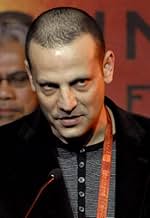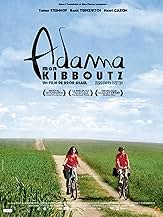Set in mid-70's, 12-year old Dvir Avni navigates between the equality values of his home-born Kibbutz and the relationship with his undermined mother, whom the Kibbutz members will to denoun... Read allSet in mid-70's, 12-year old Dvir Avni navigates between the equality values of his home-born Kibbutz and the relationship with his undermined mother, whom the Kibbutz members will to denounce.Set in mid-70's, 12-year old Dvir Avni navigates between the equality values of his home-born Kibbutz and the relationship with his undermined mother, whom the Kibbutz members will to denounce.
- Awards
- 9 wins & 7 nominations total
- Director
- Writer
- All cast & crew
- Production, box office & more at IMDbPro
Featured reviews
The cinematography in this film is somewhat fantastic. For this I feel the production team really succeeded and proved that amongst other international contemporary film makers, Israel can too present a film that is aesthetically pleasing.
In the director's cut, Dror Shaul claims that the film is of 'one boys vision' of his own current affairs and that there are no political views that hide behind the surface of the film. I disagree with this statement and although I have never experienced a Kibbutz before I am able to understand that this film takes on a very one-sided stance of the system, propaganda and regime of the kibbutz. Shaul fails to balance out the film and portrays it as an obsolete institute of total corrupt. He paints the opposite of an idealistic vision over it and I feel this might cause a bit of controversy amongst previous or current kibbutz members.
The story line is emotional. It really seems as though the director, team and actors have put a lot of effort and time into producing a story which is captivating yet subjective, submitting a senseful and sensitive drama which encourages the viewer to follow and react in accordance to the actors emotions.
It is a film to watch and certainly one of the greats of upcoming contemporary Israeli cinema.
In the director's cut, Dror Shaul claims that the film is of 'one boys vision' of his own current affairs and that there are no political views that hide behind the surface of the film. I disagree with this statement and although I have never experienced a Kibbutz before I am able to understand that this film takes on a very one-sided stance of the system, propaganda and regime of the kibbutz. Shaul fails to balance out the film and portrays it as an obsolete institute of total corrupt. He paints the opposite of an idealistic vision over it and I feel this might cause a bit of controversy amongst previous or current kibbutz members.
The story line is emotional. It really seems as though the director, team and actors have put a lot of effort and time into producing a story which is captivating yet subjective, submitting a senseful and sensitive drama which encourages the viewer to follow and react in accordance to the actors emotions.
It is a film to watch and certainly one of the greats of upcoming contemporary Israeli cinema.
I saw Sweet Mud at the Philadelphia Film Festival last night. My friend and I were expecting something slow-moving and maybe boring at times, but we were pleasantly surprised. The movie sold out (word must have gotten around) and you could tell by the audience's reactions that everyone loved it. This film gives such a detailed view of life on a commune, and at the same time it showed a young boy's struggle with his depressed single mother with plenty of comedic moments. I'm not much of a reviewer but I highly recommend seeing this film... it's playing again in Philadelphia this Tuesday at the Ritz Five, for those of you who live in the area!
Terribly disturbing to see a man (thankfully not realistically) receiving oral sex from a calf in the opening few minutes. Fortunately it gets better. Much better. It won the World Cinema Jury Prize - Dramatic at Sundance as well as the top Israeli film award. We get to see a slice of life on a kibbutz in the 70's and what is presented is portrayed quite well here. It does appear, though, that there is some dissension amongst Jews on whether this is an accurate view or not. From this outsider's view, it's a great story that's well told with fantastic acting.
7.1 / 10 stars
--Zoooma, a Kat Pirate Screener
7.1 / 10 stars
--Zoooma, a Kat Pirate Screener
8Nozz
I saw this one on Netflix, and if everything mentioned in the other reviews is in the movie, then the Netflix version cuts at least one episode a bit short. Elsewhere in the movie I noticed what seemed to be an unexplained jump slightly forward in time. But there was a complete story, and it was a good one, about a boy whose kibbutz is putting him through some pro forma tests of maturity for his (secular) bar mitzva while he's being tested much more seriously by real life as his mentally unstable mother has no one else to turn to. A memorial note at the end hints that the story has a certain autobiographical connection; I don't know whether it's direct or not. As other reviews here note, we see the kibbutz through a severely dystopian lens. It would be unfortunate if the audience comes away convinced that kibbutz life was always that bad. Some people remember childhood on the kibbutz as idyllic, although it obviously wasn't that way for everyone.
By the way, I have no idea why the title in English is "Sweet Mud." The Hebrew title means "Crazy Soil."
By the way, I have no idea why the title in English is "Sweet Mud." The Hebrew title means "Crazy Soil."
10tonyw-21
This is the second feature film by Dror Shaul. Set on an Israeli kibbutz Bet-Gvurot in 1974, this provocative film explores life on the kibbutzim in its most hilarious and dark forms. Dvir (Tom Steinhof) is an adventurous 12-year old who protects his mother Miri (Roni Yudkevitch), a single parent who is emotionally unstable. Miri forms a long-distance romance with an older man in Switzerland Stephan (Henri Garcin). When Stephan comes to visit, Miri emerges from her darkness and for an instant, her life shines. When Stephan's actions bring him into conflict with the leadership of the kibbutz, he is banished and Miri regresses. Dvir's brother Eyal (Pini Tabger) goes off to fight in the Yom Kippur War and Dvir is on his own and restless as he approaches his Bar Mitzvah. The film paints an unflattering image of life on the kibbutz, raising issues such as alcoholism, promiscuity, and acute isolation. When Shaul offered an advance screening at a kibbutz in Israel, they were reportedly shocked and offended. A poignant and funny film with a bitter-sweet ending.
Did you know
- TriviaDanielle Kitsis's debut.
Details
Box office
- Budget
- $1,500,000 (estimated)
- Gross worldwide
- $122,307
- Runtime
- 1h 30m(90 min)
- Color
- Sound mix
- Aspect ratio
- 1.85 : 1
Contribute to this page
Suggest an edit or add missing content













